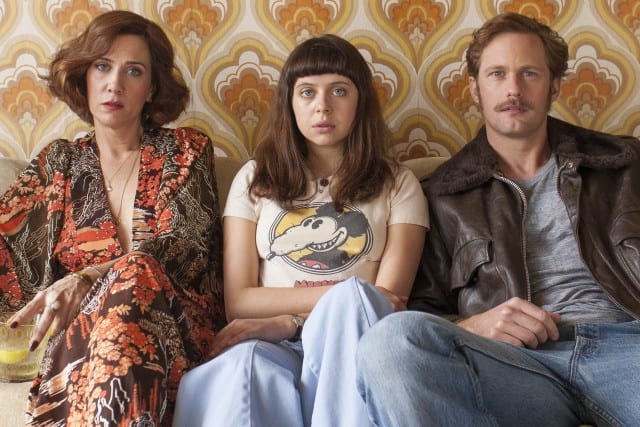
Written and directed by Marielle Heller
USA, 2015
Moviegoers have had more than their fare share of cinematic bildungsromans to choose from in recent years. Even for those who found last year’s Boyhood to be too focused on the male experience of growing up, Blue is the Warmest Color, released the previous year, provided a more than suitable alternative. Outside of the realist lens, Pixar’s Inside Out gave a powerful and humorous glimpse inside the mind of an eleven-year girl as she coped with a move and struggled with the anxieties of adolescence. But despite this plethora of films on more or less the same subject, none of them them have quite attacked it in the same manner as The Diary of a Teenage Girl, the debut of writer/director Marielle Heller (adapted from the autobiographical novel of the same name by Phoebe Gloeckner).
Diary tells the story of Minnie Goetze (Bel Powley—more on her in a bit), a fifteen year old girl living in San Francisco in the free-spirited seventies. She begins the film in a mindset familiar to many who’ve survived the tumult of adolescence—after convincing herself she’d be a virgin for the rest of her life, she finally has sex with someone. The charm of these opening minutes soon turns ugly as we learn that her partner was not someone of her own age, but the thirty-something boyfriend, Monroe, (Alexander Skarsgård) of her mother, Charlotte (Kristen Wiig).
The film certainly doesn’t downplay the heinousness of Monroe’s actions, but it also doesn’t shy away from the raw sexuality between him and Minnie. Although the sex scenes aren’t nearly as lengthy or explicit as those in Blue, Heller’s constant use of handheld close-ups gives them an intimacy which Blue ultimately lacks. Many questioned whether the sex in Blue was exploitative, but there’s simply too much emotion on display in Diary’s sex scenes to imagine the film provoking similar complaints. As is true for many teenagers, sex is a crucial component of Minnie’s coming-of-age, and Diary succeeds in part due to its willingness to embrace this fact.
Although Diary does devote quite a bit of time to the relationship between Minnie and Monroe, it’s too smart of a film to define her solely by it. She hangs out with her best friend, Kimmie (Madeleine Waters), fights with her mother, and harbors aspirations of being an artist. She has a tortured relationship with her mother’s ex-husband (Christopher Meloni), teeters between loving and hating her younger sister (Abigail Wait), and discovers that she has a range of sexual possibilities which don’t include Monroe (or even men). Too many narratives about rape fail in part by making it the only important thing about their female characters; Diary succeeds by making Minnie’s statutory rape merely one aspect of her complex personal history.
On top of this, the film also works as well as it does thanks to Heller’s unique and idiosyncratic narrative style. The voice-over is hardly a newfangled cinematic trick, but it’s used to a particularly strong effect here, as it gives Minnie a chance to voice her thoughts in situations in which she’d otherwise be stifled. The animation provides a visual depiction of Minnie’s inner psychology, as well as making apparent her artistic sensibility. In contrast with the litany of stories which define female characters solely in the context of men, Diary uses these cinematic tools to make its female protagonist independent and self-determined in a manner all too infrequent in popular culture.
Heller’s techniques are also aided by the stunning performance of Powley, which functions as the film’s ultimate centerpiece. Her bubbliness is perfect for conveying Minnie’s youthful exuberance, but she attacks the character’s darker moments with an equivalent zeal. Minnie is a complex character with a wide range of emotions, and Powley doesn’t shy away from representing any of them.
Outside of Powley, though, Diary is equally intent on depicting the sexuality of women of all ages. Although Minnie gets the lion’s share of the film’s attention and sympathies, it depicts Charlotte as a sexual being whose age doesn’t deter her desire. Even though her sexuality often comes at Minnie’s expense, Diary respects it as being something she can’t avoid. Minnie and Charlotte are both independent women with their own desires, and Diary is unflinchingly honest about showing the characters as the imperfect human beings they are.
It’s an overall lack of shyness which ultimately makes Diary into the film it is. There’s been no shortage of films about teenagers throughout cinematic history, but not many have approached adolescence with the honesty of Heller’s film. Modify the subject matter to “adolescent girls” and the amount of films focusing on it zero, and Diary would be worthy of acclaim for its mere attempt to rectify the dearth. But beyond simply being an embrace of female sexuality, Diary combines its frankness with pitch-perfect performances, a loving tone, and unique narration to make it one-of-a-kind film.



